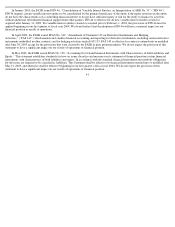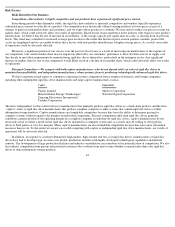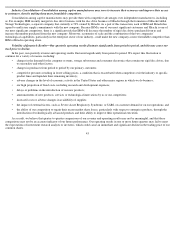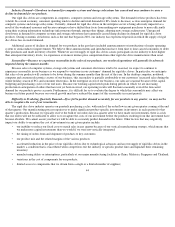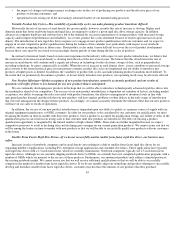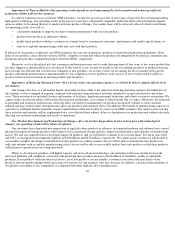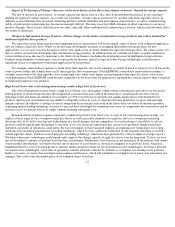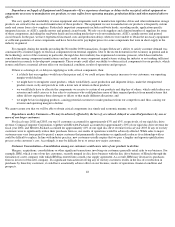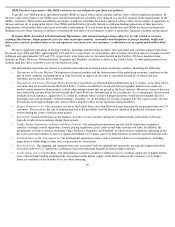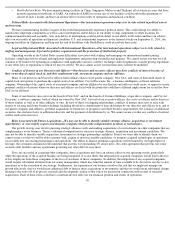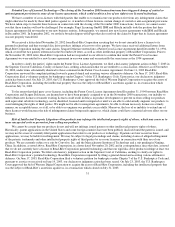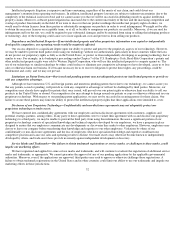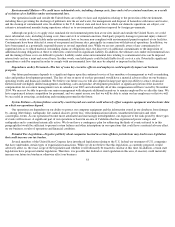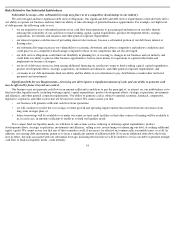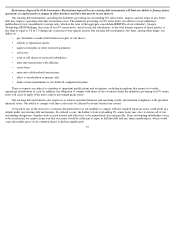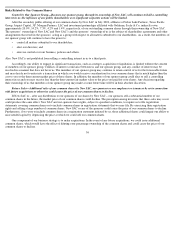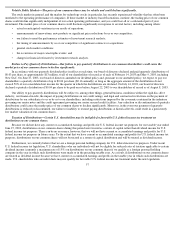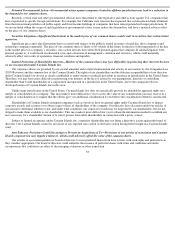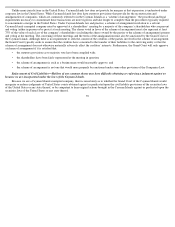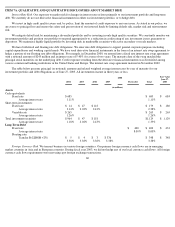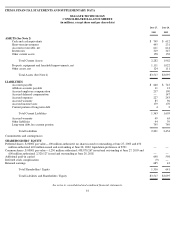Seagate 2002 Annual Report Download - page 56
Download and view the complete annual report
Please find page 56 of the 2002 Seagate annual report below. You can navigate through the pages in the report by either clicking on the pages listed below, or by using the keyword search tool below to find specific information within the annual report.
Potential Loss of Licensed Technology—The closing of the November 2000 transactions may have triggered change of control or
anti-assignment provisions in some of our license agreements, which could result in a loss of our right to use licensed technology.
We have a number of cross-licenses with third parties that enable us to manufacture our products free from any infringement claims that
might otherwise be made by these third parties against us. A number of these licenses contain change of control or anti-assignment provisions.
We have taken steps to transfer these licenses in connection with the closing of the November 2000 transactions; however, we cannot assure
you that these transfers will not be challenged. For example, Papst Licensing GmbH, IBM and Hitachi initially took the position that their
license agreements did not transfer to our new business entities. Subsequently, we entered into new license agreements with IBM and Hitachi
in December 2001. In September 2002, we settled a broader dispute with Papst that also resolved the claim by Papst that its license agreement
was not properly transferred.
We received a letter dated November 20, 2002 from Read-Rite Corporation asserting that we do not currently have a license to its
patented technology and that our rigid disc drive products infringe at least two of its patents. We have since received additional letters from
Read-Rite Corporation making the same claims. Seagate Delaware entered into a Patent Cross License Agreement dated December 31, 1994,
which covered the two patents referenced in the November 20 letter, as well as other intellectual property of Read-Rite Corporation. Prior to
the November 20, 2002 letter, Read-Rite Corporation had not responded to our efforts to confirm that under the Patent Cross License
Agreement we were entitled to a new license agreement in our own name and on materially the same terms as the 1994 agreement.
In order to clarify the parties’
rights under the Patent Cross License Agreement, we filed a declaratory judgment action on May 7, 2003 in
the Superior Court of California, County of Santa Clara, seeking a declaration that we are entitled to a cross-license, effective as of November
22, 2000, under terms substantially identical to those contained in the Patent Cross License Agreement. On June 11, 2003 Read-Rite
Corporation answered the complaint putting forward a general denial and asserting various affirmative defenses. On June 17, 2003, Read-Rite
Corporation filed a voluntary petition for bankruptcy under Chapter 7 of the U.S. Bankruptcy Code. Upon notice, our declaratory judgment
action has been stayed. On July 23, 2003, the U.S. Bankruptcy Court approved the bid of Western Digital Corporation to acquire the assets of
Read-Rite Corporation, including the intellectual property that was the subject of Read-Rite’s assertions against us, in a transaction which
closed on July 31, 2003.
To the extent that third party cross-licenses, including the Patent Cross License Agreement dated December 31, 1994 between Read-Rite
Corporation and Seagate Delaware, are deemed not to have been properly assigned to us in the November 2000 transactions, our inability to
either obtain new licenses or transfer existing licenses could result in delays in product development or prevent us from selling our products
until equivalent substitute technology can be identified, licensed and/or integrated or until we are able to substantially engineer our products to
avoid infringing the rights of third parties. We might not be able to renegotiate agreements, be able to obtain necessary licenses in a timely
manner, on acceptable terms, or at all, or be able to re-engineer our products successfully. Moreover, the loss of or inability to extend any of
these licenses would increase the risk of infringement claims being made against us, which claims could have a material adverse effect on our
business.
Risk of Intellectual Property Litigation—Our products may infringe the intellectual property rights of others, which may cause us to
incur unexpected costs or prevent us from selling our products.
We cannot be certain that our products do not and will not infringe issued patents or other intellectual property rights of others.
Historically, patent applications in the United States and some foreign countries have not been publicly disclosed until the patent is issued, and
we may not be aware of currently filed patent applications that relate to our products or technology. If patents are later issued on these
applications, we may be liable for infringement. We may be subject to legal proceedings and claims, including claims of alleged infringement
of the patents, trademarks and other intellectual property rights of third parties by us or our licensees in connection with their use of our
products. We are currently subject to a suit by Convolve, Inc. and the Massachusetts Institute of Technology and a suit pending in Nanjing,
China. In addition, as noted above, Read-Rite Corporation, in a letter dated November 20, 2002 and in correspondence since that date, asserted
that we do not currently have a license to Read-
Rite Corporation patented technology and that our rigid disc drive products infringe at least two
Read-Rite Corporation patents. We filed a declaratory judgment action in the Superior Court of California, seeking to clarify our rights to
Read-Rite Corporation’s patented technology. Read-Rite Corporation responded by filing a general denial and asserting various affirmative
defenses. On June 17, 2003, Read-
Rite Corporation filed a voluntary petition for bankruptcy under Chapter 7 of the U.S. Bankruptcy Code and,
pursuant to a notice we received on June 19, 2003, our declaratory judgment action has been stayed. On July 23, 2003, the U.S. Bankruptcy
Court approved the bid of Western Digital Corporation to acquire the assets of Read-Rite Corporation, including the intellectual property that
was the subject of Read-Rite’s assertions against us, in a transaction which closed on July 31, 2003.
51


